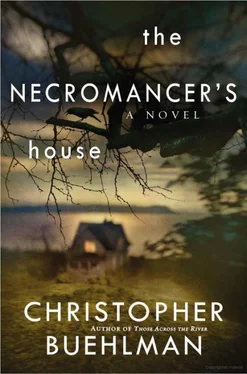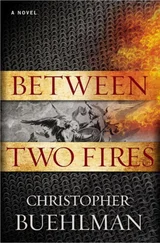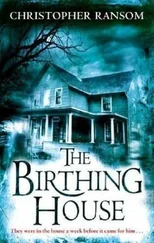Sergei says the Russian word for turquoise .
Georgi switches to English.
“Yes, biryuzoviy . It’s an unusual color, and an unusual car. Look,” he says, showing him a cut-out page from an auto sales magazine, a 1968 Mustang circled in red pen, a tiny skull drawn badly near it.
“It’s a nice car,” Sergei says.
They come to the end of the road, execute a three-point turn, and go back.
And then, good luck!
The turquoise Mustang appears from a tree-hidden drive that seems to lead to no house; it has to be the same car. And it is a magnificent beast. It takes a right onto the road and tears out, using its big, Vietnam-era motor to vault down the winding road. The motor is louder than those in modern cars; it sounds powerful, like a predator. And classic. The man who owns such a car will be good with his hands, a good worker. It occurs to Sergei that he may like the man in the Mustang more than the nephew of his old associate.
But a promise is a promise.
They follow the Mustang out of Dog Neck Harbor all the way past Fair Haven, where it pulls off 104A and parks behind a barn that has been converted into an auto garage across the street from silos. North Star. Nice name.
The driver has already gone into the garage when they pull around.
“Remember,” Georgi says, “he has long black hair like an Indian and he is thin.”
“Am I a man you must say things twice to?”
“Sorry.”
“Let me see your gun.”
Georgi looks around, then removes his snub-nosed .38.
Sergei takes it from him, opens the cylinder, spins it, his heart gladdening at the sight of brass. Shell casings are his favorite jewelry.
“This is ready. Try not to shoot me.”
He now pulls out his own Makarov, flips down the safety, puts it back into his coat.
They get out.
Open the door, walk in like they know what they’re doing. Sneaking is for idiots; people who look as though they have a purpose rarely get questioned.
They find themselves in a back room, an employee room of sorts, where a number of heavily tattooed Mexicans sit around a table littered with tequila bottles and half-eaten plates smeared with brown and green sauces.
The place smells like chocolate, cinnamon, and garlic.
Now a voice behind them.
Mexican accent.
“Keep your hands out of your pockets.”
They do.
“Why were you following me?”
“I like Mustangs,” Sergei says. “I was hoping that one might be for sale. Is it?”
Chancho grunts.
The men at the table look at the Russians with eyes like brown stone. Several of them have their hands ominously under the table.
“Why were you coming in the back door to talk about buying a car?”
“That’s the way you came in. We wanted to talk to you.”
Chancho grunts.
Gonzo walks in, sees guns, puts his hands over his eyes like the see-no-evil monkey and walks briskly out.
“Why the pistolas ? You know, it’s not nice to bring guns to the back door to ask about buying a car.”
“Please,” Georgi starts.
Sergei says, in Russian, “If you beg I will shoot you myself.”
Then, in English, “This was our mistake. I apologize for disturbing you. With your permission, we will leave now and we will not return.”
“Give me your wallets,” Chancho says. “And put your guns on the table. Like slow, though. Super slow.”
They do.
Chancho looks in the wallets, grunts.
“Lotta money in these wallets. If I still stole I’d be real happy about these wallets.”
The Russians stay quiet.
“But I don’t steal, not no more,” he says. “Not money, anyway.”
He takes the driver’s licenses out of both wallets, gives the wallets back, always behind the Russians, and they do not look at him.
Now he tosses the driver’s licenses on the table. Georgi’s lands in pico de gallo.
“My cousins, they gonna keep those. They could be fake, but I don’t think so. If something bad happens to me, something real bad’s gonna happen to you. ¿Comprende, pendejos? ”
“ Ponymayu ,” Sergei says, nodding.
The Mexicans walk them outside.
Chancho asks them to open the car doors.
They do.
Chancho pulls out a large, brutal-looking knife and cuts long slashes in the upholstery. He does this impassively, taking his time, like fucking up car seats is just another service they offer at North Star, like it’s something he wants to do well.
He motions for them to get back in their cars.
They do.
“ Adios, pendejos. And don’t come back.”
Before the disgraced Volkswagen pulls out of the North Star Garage, Sergei Alexandrovich Rozhkov looks at Georgi.
“You let a woman tell you what to do, and this is what happens.”
“But…”
“Be quiet. Misha drowned. You’re an idiot. I’m going back to Brooklyn.”
Night.
A new moon, the sky and the lake beneath it as black as oil.
The woman stands naked atop the cabin, naked but for a canvas bag slung over her shoulder. She readies two bottles, vodka bottles now filled to the neck with blood.
One contains rooster’s blood.
One does not.
She takes a swig from that one, then empties both into a bucket from which a birch broom juts. She ties the empty bottles together and hangs them around her neck. She uses the broom to drizzle and flick the blood on her roof, knowing she’ll have flies tomorrow, but there’s nothing for it. This is how it’s done. She doesn’t have to coat the whole roof—there isn’t enough for that anyway—but she must not leave two handsbreadths unbloodied.
This is an old spell, and the old spells are particular.
She walks backward toward the ladder, walking the bucket with her, sweeping behind so she doesn’t get any on the bottoms of her feet. Every yard or so she rests the broom, takes hen feathers from her shoulder sack and sprinkles these on the roof, repeating a verse in Russian and concentrating on what she wants.
The bottles knock together tenderly sometimes, reminding her how testes, breasts, and ovaries—all the genitive organs—come in twos. Three is the number for gating, invocation, and killing. Four is for protection and weather. But two is for creation.
Two babes, a boy and a girl.
Two chickens, a rooster and a hen.
Down the ladder now, and she gives the Man Who Will Not Look At Her the bottles. He puts them in the garbage bag with the bones. The hen and rooster bones, and the bones that are not hen or rooster bones.
And the clothes.
The little clothes.
In the bag that will be rowed out to the lake.
She stands now on the porch watching the Cold Man row.
Moroz.
The Man Who Will Not Look At Her will not row—he will go back to his room hooded like a bird and sitting somewhere between sleep and waking. He learned quickly, hoods himself obediently, goes to town to run errands and never dares to run. Knows the Cold Man would come for him, and for his. He took to it so naturally because he is a coward. Not like the thief.
Things are beginning to move against the thief.
He is strong now, not like then.
He has killed the Baba in the woods, or caused her to be killed.
His bitch in the water killed sweet Misha.
His house is full of tricks.
He has friends, many friends.
First, the friends.
Then the fear will come to him, weaken him.
And then she will close his eyes.
Take back what is hers.
He hid himself, but that magic is waning.
She knows his town, even what road.
He has spread himself too thin with other spells.
She will find him soon.
Tonight’s magic must sleep, but it will awaken when the moon waxes fat and full.
Читать дальше












